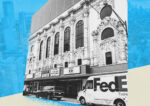Second Horizon Capital Group hopes a 41,000 square foot lease with anchor tenant Burlington will begin the revival of Chicago Ridge Mall.
The discount clothing retailer, formerly Burlington Coat Factory, is the first anchor tenant to sign a lease since Miami Beach-based Second Horizon bought the distressed mall from Barry Steinlich’s Starwood Capital Group at the end of February. Burlington had over 1,000 stores nationwide as of late 2023.
A Starwood venture failed to pay off an $80 million loan tied to the property by its July 2023 expiration. The firm had already pushed back the original maturity date in July 2022, after negotiating a loan modification with Atlanta-based lender Trimont Real Estate Advisors.
While suburban malls have been decimated by the rise of e-commerce, some firms are betting on a comeback.
In February, New York-based Feil Organization, infused $8 million for renovations to the North Riverside Park Mall. That was after Feil narrowly escaped foreclosure on a $75 million loan for the property.
Although a sale price was not disclosed, it is likely that Chicago Ridge Mall traded for far less than it was once worth, presenting an opportunity for Second Horizon to lead a turnaround effort.
Read more



Such opportunities do not come without risk and complication. The changing retail environment lends itself to building real estate for multiple uses on a single site, but malls are from a blank canvas.
The sprawling sites are often marked by years-old easements, development agreements and land grabs. And moving forward with new buildings also means gaining approval from local governments.
Yet Midwest cities and suburbs are uniquely poised for this kind of development in a way other parts of the country aren’t because of the prevalence of properties with sizable acreage.
